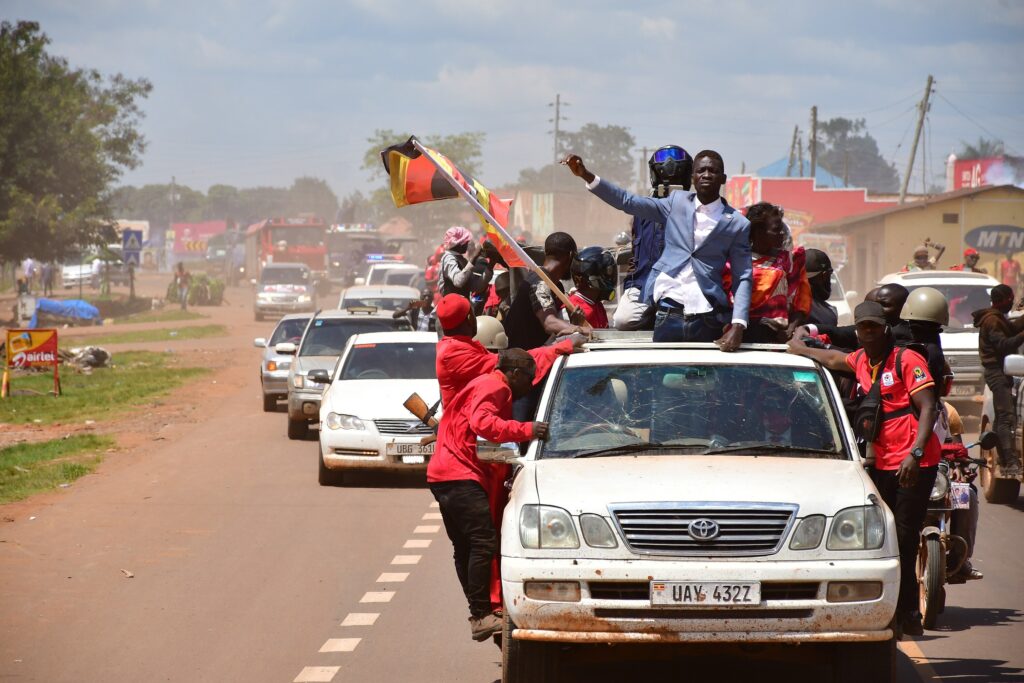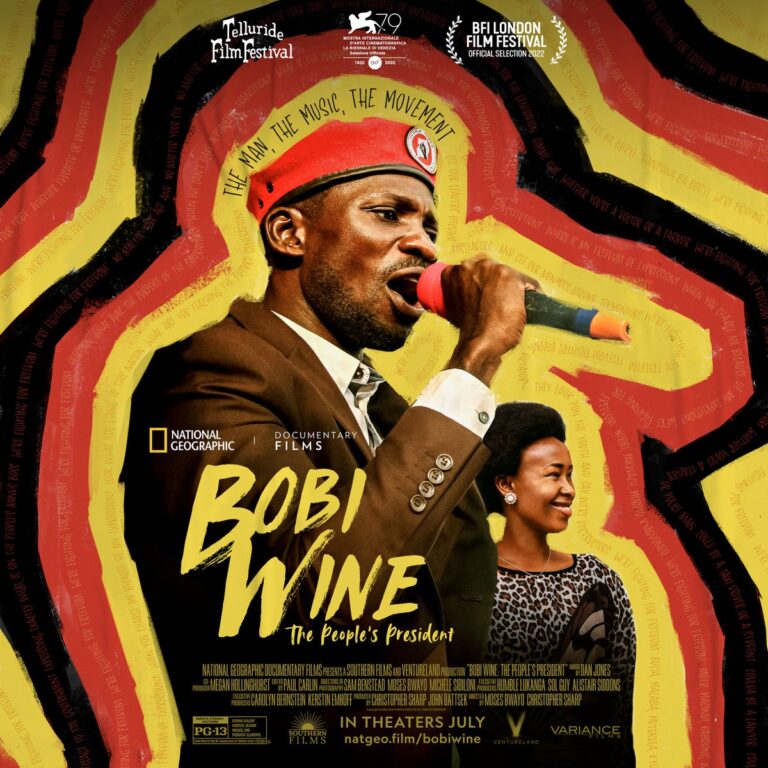Bobi Wine The People’s President – Snapshot
Bobi Wine The People’s President documents five years in the life of a man who used his musical success to challenge the corrupt and autocratic rule of Uganda’s president. The movie succeeds in meshing music and politics in an intriguing mix. (4*)
Where to Watch:
Stream: Disney+/Hulu
Rent: (Nowhere)
Bobi Wine The People’s President – The Oscar Buzz
Oscar Nominations (1) / Oscar Wins (0) :
Documentary Feature
The last of this year’s documentaries, Bobi Wine The People’s President is also the fifth documentary from a foreign country. I’m guessing that, similar to some of the other documentaries, it was originally submitted in the International Feature category but given a slot in the documentary competition because they had so many. This one is from Uganda and although some of the speeches are in native tongues, probably Swahili, English is an official language in Uganda and is spoken throughout the movie.
The film has a long list of producers, including substantial involvement from National Geographic. Otherwise the crew is relatively small and young. Both directors are relatively new to making films, with this being the only film Christopher Sharp has done and the first film as director for Moses Bwayo. Bwayo is also credited as cinematographer along with two others. The editor, Paul Carlin, started work in 1990 and has largely been involved in British TV and film. I couldn’t find any Oscar connections with anyone on the crew so this is a first experience for them.
Bobi Wine The People’s President – Related Movies
None (I couldn’t find any crew involvement in any film I’ve reviewed or seen!)
Bobi Wine The People’s President – What Others Think
As noted in previous documentary reviews, this genre does not get a lot of love. Documentary afficionados are loyal and enthusiastic but not very numerous. In this case, the ranking is based on less than 2000 viewer ratings. Bobi Wine the People’s President was ranked at the bottom of the five documentaries and 25th out of all 38 nominated films (tied with Flamin’ Hot – which was only nominated for Original Song). Audience Review headlines include “Great Film about Human Rights and the Power of the People” and “Not to be Missed. Important and Prophetic.”
The professional critics seemed to agree, placing it 22nd out of all 38 films but still at the bottom of the documentary list. Brandon David Wilson (RogerEbert) summarized the film’s value with “What only the film can do is show you how Bobi Wine evolves into a powerful spokesman for democratic values as he tries to save Uganda from autocracy.” He also praised the camera work with “The beauty of the land clashes dramatically with the ugliness of the presidential campaign.” Glenn Kenny (New York Times) called Bobi Wine The People’s President “a mostly engaging portrait” as he marveled at how the directors “seem to have had intimate access to Wine and his family” but that “doesn’t always work in the movie’s favor.”
Averaging all the ratings together still puts this film at the bottom of the documentaries and just 21st out of all 38 solidly in the middle of this year’s crop and tied with the equally provocative The Society of the Snow!
Bobi Wine The People’s President – Special Mention
Uganda, Past and Present – If you are as dumb as I am about Uganda, you might appreciate knowing something of Uganda to put the events of Bobi Wine The People’s President in context. (Note: I didn’t know this stuff but did some research so here is a brief summary.)
Uganda is a land-locked East-African country bordered by the countries of South Sudan, Kenya, Tanzania, Rwanda, and The Congo. It contains substantial portions of most of East Africa’s Great Lakes. It has a diverse geography of mountains, hills, and lakes and a, mostly, Tropical Savannah climate, lush in resources like coffee and oil and gas. It has made substantial progress in reducing the poverty incidence rate from 56% of the population in 1992 to 24.5% in 2009, but still in GDP/person, Uganda ranks 167 out of 192 countries (based on current IMF estimates). Its population numbers more than 49 million with almost a fifth of that in Kampala, the capital. The official languages are English and Swahili and 84% of the population is of Christian faiths (mostly Catholic and Anglican) and most of the rest practicing Islam.
I can’t possibly write a history of the country since early humans roamed the Savannah, so I’ll do a simple fast forward to 1894 when Britain made it one of their protectorates. As part of the British Empire, their dominance and control explains a lot of Ugandan’s language and religious patterns. But beginning in the 1960’s, Britain began to grant full independence to much of its holdings and Uganda became its own country and was admitted to the United Nations in 1962. A Republic was declared in 1963 and four years later a unique constitution was adopted with Milton Obote declared the President.
Tribal politics continued to run large in Uganda as elsewhere in Africa and Idi Amin staged a military coup in 1971 and ruled brutally for eight years until he was overthrown. Then, for eight years Uganda engaged in guerilla warfare between different groups until Yoweri Museveni’s National Resistance Movement took power in 1986. His rule brought unusual stability, economic growth, and alleviation of poverty but also authoritarianism and human rights abuses. He pushed through a new constitution in 1995 and his political and economic improvements were recognized and encouraged by western governments, in his early years. He won his first election and was re-elected five times (although, as the movie notes, the most recent one in 2021 is in some doubt.)
As Museveni aged and enjoyed the perks of his ongoing power, corruption increased. Transparency International rated it 151st out of 176 countries as one of the most corrupt and the World Bank places it in the worst 12 percent of countries around the world. As the film documents, he was able to engineer, possibly through widespread payoffs, an amendment to the constitution ensuring he could remain as President for life. And as part of his efforts to create divisions, he secured a bill a little over a year ago that made identifying as a homosexual punishable by life in prison and death in some instances. His fear of homosexuals is expressed in the movie as well.
And if we think that things are getting any better, then note that just this month, Bobi Wine was once again injured when police fired a tear gas canister into his leg during one of his rallies. Museveni’s iron-clad control of Uganda continues.
Bobi Wine The People’s President – Michael’s Moments
Filmed over a five year period, Bobi Wine The People’s President is a very good documentary with great feeling for how a popular singer used his music and then his life to work for the betterment of the Ugandan people. Bobi Wine came to see the abuse, degradation, and corruption in the 35-year – and counting – regime of Uganda’s strong-man, Yoweri Museveni. Bobi sacrificed, and risked, much of his personal life to challenge the man who once held out great promise for the Ugandan people. Perhaps one of the strongest attributes of the movie is how intimately involved the filmmakers became in Bobi’s personal life, down to filming difficult conversations between him and his wife and four young children. The film gets much of its strength from how close the filmmakers and their subjects were.
And, like 20 Days in Mariupol, Bobi Wine The People’s President made great use of drone photography. In fly-over shots, we gained a deep appreciation for both the great physical beauty of the Ugandan landscape, but also how large Kampala ghettos have become.
A third terrific aspect of the film was the role of music. Yes, there was a soundtrack scored by Dan Jones ( who has worked primarily in British television), but more importantly the songs of Bobi Wine himself were not just background music to a movie, but were political tools. During the Covid-19 pandemic, he released several songs promoting safe practices which were all the more essential given limited access to vaccines. His music exhibited his concern for the welfare of the people. But he also used his music to promote his message of hope and self determination for the millions of people in Uganda’s ghettos. One of his most popular songs, which also has a central role in the movie, is all about “Freedom”. His music is considered “afrobeat” and reminds me a lot of reggae and Bob Marley. Pay attention to his music because his songs were the reason he first became “President of the Ghetto” and gave him the popularity that he could then use for political capital. (Stream his album Kyarenga for a good sampling of his music). The filmmakers rightly sprinkle his music throughout the movie.
Perhaps my strongest takeaway from Bobi Wine The People’s President is how much it resonates with contemporary American politics, in unflattering ways. One highly unexpected parallel I saw is how similar Bobi Wine’s complaints about Musuveni are to MAGA complaints about the current administration. Talk of corruption, political prosecutions, and rigged elections are remarkably similar. Of course the unfounded MAGA complaints ignore the prolific system of checks and balances that still exist in our country. But what is striking is how comparable the rhetoric is. And then push that just a bit further and think about what Trump says he will do if elected. How easy is it to imagine Trump pushing through a constitutional amendment to eliminate the two-term limit on Presidents, or even, as he says he will do, suspend constitutional provisions that don’t work in his favor, consolidate power in the Presidential office, and reward, richly, those who help him? Just how different is Trump’s promise from the Musuveni reality? Uganda was definitely one of Trump’s “shith*le” countries, but how different would America be under Trump’s regime?
Bobi Wine The People’s President is not a great movie and it isn’t the best of this year’s documentaries. The movie is a bit too long and some of the personal family scenes seem unnecessarily emphasized, and almost invasive. The film had to walk a fine line balancing his personal and political lives and it might have worked a bit better if it had avoided spending large blocks of time on either but mixing them up more. If you are interested in Africa, music, or politics and the intriguing life of an admirable man, watch the movie. (4*)


